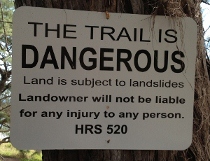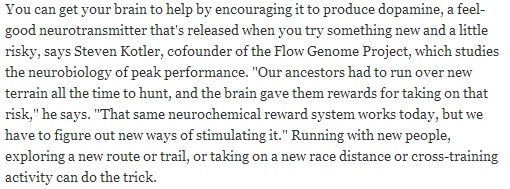Author Erica Jong said, “The trouble is, if you don’t risk anything, you risk even more.”
In running, the biggest risk is not resolving something that can be easily resolved.
For a coach like me, it’s difficult to see all the problems that runners are having. It’s like your friend who’s in a terrible relationship but keeps seeing their boyfriend or girlfriend. You KNOW they’d be so much happier if they moved on and found someone who made them a lot happier.

But they just don’t see it. They’re lost in their own internal struggle. So even though they’d fix all their relationship problems by ending their current relationship, they just don’t do it.
Sometimes, I feel the same way. I KNOW what most runners should be doing. But it’s a constant struggle because I can’t individually coach hundreds or thousands of runners.
Look at all these examples:
I struggle with constant ITBS and don’t even know where to start. (Try the ITB Rehab Routine, then a detailed treatment protocol if that doesn’t work)
I have trouble staying motivated so my consistency is really bad. (Join Team SR)
I have no idea how to run fartleks, intervals, or strides. (Read the book Run Faster)
I’m looking for a good strength training program for women. (Get Strength Training for Runners)
I don’t know a useful way to track my progress (join Daily Mile)
When do you insert strength training into your week? I’m lost. (Read my post How to Schedule Strength Workouts)
It seems like every time I fix an injury a totally new one pops up. (Get our free injury prevention course)
I could go on all day.
Or this, which literally makes me sad: “I wish I knew what my biggest struggle is – I have no idea what will help me.”
This is the biggest risk of all – if you do nothing, you risk everything.
Long-time readers will know that I encourage runners to take action and be proactive with their running. Runners who consistently improve are those who are always learning, tweaking, seeking new running experiences, and challenging themselves.
That may mean reading a new running book or using a custom training plan. It could also mean signing up for your first race, my upcoming Boot Camp course, or your first marathon.
Always challenge yourself to explore new territory. Run race distances you’ve never done before. Tweak your training to add more strength exercises or trail running.
Ask yourself, “How can I change my training a little to see more improvement?”
If you fail because you haven’t taken action, that’s a negative failure. That’s NOT how you should fail.
Why I Encourage The Right Risks
“Every time I fail I assume I will be a stronger person for it.” – Joan Benoit Samuelson
Instead of failing the wrong way – like not reading a good running book or investing in yourself – I encourage runners to fail the right way.
Positive risks include joining a running club (“what if they’re too fast?”) or attempting your first marathon (“I’ll never be ready for 26.2 miles…”)
Without risking failure, you’ll never truly recognize your potential because many times it can lead to breakthroughs.
Hundreds of runners have taken a risk on a personalized training plan – and look at the results:
“Getting a personalized training plan from finishing a 10k to PRing a marathon to a running my first 6hour ultra in just two months (!) was probably one of the best things I’ve ever done for my running. I don’t think I could have handled the short time period with the increasing mileage by myself and come out of it, not only alive but with great results and injury free!” – Linda
“The advice and training plan that you’ve provided have been invaluable — my mind still goes back to my chiropractor telling me that there’s no way that my IT Band should’ve healed so quickly — I dig that!” – Dave
“I ran the Richmond Half in 1:38:14 yesterday – almost 5 minutes faster than last year so I was really pleased. It felt great to be back at a faster clip. I ran a negative split and felt strong and more importantly healthy throughout the race.” – Whitney
Taking a risk in a race is equally important. When was the last time you just went for it?
There comes a time when every runner needs to take a risk and start faster than they think they should. Often it’s the only way to find out what you’re made out of. Race breakthroughs don’t happen if you’re always conservative.
The cautious among you might be asking, “But, won’t I slow down, feel terrible, and run slower than my PR?” Sure, that could happen. And it’s more probable than you having a breakthrough race. But you’ll never know…
Indeed, this recent Runner’s World article illustrates how important it is to take calculated, smart risks with your training:

With no risk, there’s no reward. Failure is likely – but breakthroughs never happen without risk.
Boot Camp Q&A
“The greatest barrier to success is the fear of failure.” – Sven Goran Eriksson
Every day runners on my private email list share their struggles with me via an open survey that I use. And it’s clear that many runners aren’t taking risks – or taking action – to resolve their problems.
While I can’t coach everyone 1-on-1, sometimes I do offer a coaching resource that can help you with your own running issues. You can learn about one of them here.
I’ve compiled this Q&A from the many questions and comments I received. I hope it’s helpful.
Will the Boot Camp include examples of runner-specific strength exercises, dynamic pre-run warm-ups, and “mini-routines?”
Yes – week 3 focuses exclusively on injury prevention. I’ll highlight the best routines for runners and when to do them. The majority require no equipment and can be done in your living room. Some routines take as little as 5-7 minutes.
Can you provide detailed treatments for dealing with common running injuries?
No, that’s outside the scope of the SR Boot Camp. However, that’s included in Injury Prevention for Runners.
Will the Boot Camp include a detailed and personalized training plan?
No, I recommend the PR Race Plan for you.
Will you tell me how often I should run? I’m not sure if I should run 3 days or 5 days per week.
It depends on your goals, fitness level, and injury profile. I recommend a custom running plan to get coaching advice.
Will there be some kind of motivation to get out there and run if I’m in a slump or when it’s dark and cold?
Week 1 focuses on developing habits and Week 2 focuses on motivation. Got ya covered!
What about correct running form – will there be anything on technique?
You bet. Not only what to do, but how to use specific workouts to reinforce proper form.
Can there be daily communication to help with accountability and motivation?
The Boot Camp course includes a daily email lesson, sometimes with additional video or a downloadable worksheet. However, I can’t be personally available – that’s reserved for runners in my 1-on-1 coaching program.
I need help finding more time to run. I have a husband, job, kids….
That’s the focus of Lesson #4! Finding more time to run is a big hurdle and the SR Boot Camp presents three ways to think differently about time management.
What about a few simple exercises to strengthen my core and deal with all my aches and pains?
Simplicity is often best and I’ll show you the best core and strength exercises that are specific to runners. Most runners respond very well after just a week or two of consistent strength work.
Will there be resources for the mental aspect of running? I miss my goals because I’ve failed to train my mind.
Absolutely. Half the course is dedicated to mental strategies that help you stay motivated, find more time to train, demolish barriers, build momentum and confidence, and set goals. It’s unlike anything I’ve ever offered before.
Last Chance for Pioneer Members
The Strength Running Boot Camp opens early for my email readers – at a discounted price. So join over 4,400 other subscribers here if you want to learn more and enroll as a pioneer member. Plus, you’ll save some cash from the normal course fee.
I understand that this isn’t for everyone. Not all of us are “consistency masters” with endless sources of motivation. Nor are all of us healthy 100% of the time. If that’s you, keep dominating. You’re taking the right risks and reaping the rewards.
But if you need a little nudge in the right direction or struggle with constant injuries, the Boot Camp is for you. You’ll get 28 days of text and video lessons to show you:
- When to do strength training (and what specific exercises are best for runners…that can be done at home)
- How to set measurable goals – big and small, short-term and long-term
- Correct running technique and the best workouts that improve your running form
- How to prioritize your schedule and juggle work, running, and life
- Tools to keep up your motivation when things get tough
- And weeks more material…
The SR Boot Camp is for runners who want to make consistent, injury-free running a habit that sticks.
2013 is the Year of Consistency – challenge yourself to take a positive risk.
For more information when it’s time to enroll – including cost, specific course lessons, and how to sign up – join my email list here or in the box below. If you’re already signed up, more info coming your way in just a few days!
EDIT: The Strength Running Boot Camp is no longer available. Sign up below to learn more about my other coaching programs.